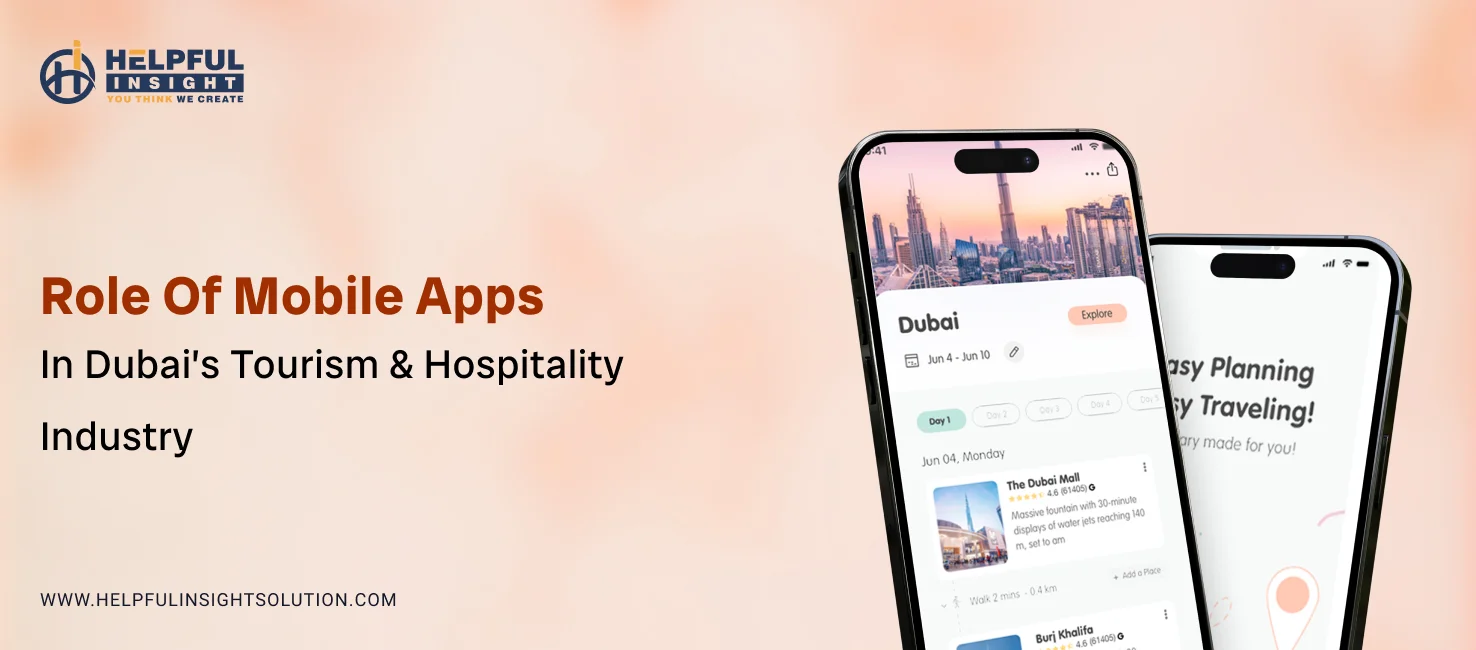Have you ever wondered about the digital shift of mobile apps that has brought to Dubai’s tourism and hospitality industry? Dubai has indeed seen a remarkable transformation thanks to the increasing reliability of smartphones that led to the emergence of AI-powered travel planning mobile applications. These applications are the ultimate solution for the challenges travelers may come across while exploring the allure and culture of Dubai, like steering through language barriers, having trouble with the logistics of an unfamiliar city, and trying to understand the culture and norms.
The presence of mobile travel planning apps has improved and enhanced the way tourists explore and experience the city, lending a helping hand to the tourism and hospitality industry. These AI-powered apps offer convenient tools to visitors, enabling them to navigate the city’s major and minor attractions, access essential information, and make reservations. In today’s blog, we are going to explore the massive impact mobile apps have on the tourism and hospitality industry of Dubai and how businesses can leverage these cutting-edge technologies to their benefit, deriving growth and pathways to success.
Overview of Dubai’s Tourism and Hospitality Industry
Dubai is known as one of the world’s leading destinations in terms of travel and tourism. The city is widely recognized for its luxurious hospitality, vibrant culture, and iconic skyscrapers. It has become a dream travel destination for many people. The city attracts millions of tourists every year from around the globe to its top-class infrastructure, pristine beaches, and adventure-filled desert safaris. Here are the key highlights of Dubai’s tourism & hospitality industry:
- Tourist Arrivals: Dubai welcomed 16.79M overnight visitors in Jan-Nov 2024, with a target to reach 25 million by 2025 under Dubai’s tourism strategy.
- Major Attractions: Burj Khalifa, Palm Jumeirah, Dubai Mall, Expo City, Dubai Marina, Desert Safari, and Dubai Creek.
- Luxury Hospitality: Dubai is home to 7-star hotels, luxurious resorts, leading international hotel chains, and high-tech architecture.
- Events & Business Tourism: The city hosts major global events like Expo 2020, the Dubai Shopping Festival, and GITEX, attracting a mass of business travelers.
- Smart City Vision: Dubai has heavily invested in the latest technologies like AI, IoT, and blockchain technologies to uplift the tourism experience.
With a government-driven focus on technological advancement and digital transformation, Dubai’s tourism industry is rapidly growing, improving amenity measures, and attracting global travelers.
What is the Importance of Mobile Technology in Modern Tourism?
Mobile technology has played a crucial role in bringing a revolutionary shift in the tourism and hospitality industry. These apps offer seamless experiences for tourists and businesses. In a tech-driven destination like Dubai, staying updated with the latest technologies and mobile apps is essential. Here’s how travel mobile apps help enhance the travel experience for visitors across various aspects:
Hassle-Free Travel Planning
With the help of mobile apps., travelers can streamline their travel planning process. From comparing hotels to booking flights and even arranging transportation, all can be done from a single app platform. This convenience eliminates the need for tedious and inconvenient interactions with travel agencies, making it more convenient and efficient to plan trips or vacations according to your preferences and comfort.
Navigation & Real-Time Assistance
Travel planning apps often contain navigation features that help tourists navigate their way around foreign surroundings and destinations. These apps offer real-time assistance, such as directions to nearby tourist spots, restaurants, hotels, lounges, emergency services, hospitals, and more. This convenience enhances the overall travel experience, especially in ultra-modern cities like Dubai.
Smart Hotel & Hospitality Services
Thanks to the advancement in mobile technology, users can enjoy smart services like mobile check-ins, contactless ordering, and room keys. These features enhance guest safety and ensure comfort while helping hotel staff by improving operational efficiency. Moreover, they allow hotels to manage reservations and inventory in real-time, ensuring better and hassle-free experiences for guests.
Personalized & AI-Driven Experiences
Travel mobile applications leverage AI technology to offer personalized recommendations to users based on their preferences and past behaviors. This customization includes tailored offers for local experiences or restaurant options, making their travel journey unique and enjoyable.
Secure Payments & Currency Trade
With the rise of digital wallets integrated into travel apps, tourists can make secure payments without depending on cash. People from around the world are adopting cashless payment methods, leading to an increase in mobile wallet apps. These digital wallets not only simplify transactions but also enhance security by reducing the risk of theft or loss of physical currency.
Enhancing Business & Event Tourism
Mobile technology facilitates business tourism by providing tools to book venues, manage itineraries, and better organize events. There are apps designed especially for corporate travelers that help streamline processes like meeting room bookings and transportation arrangements, thereby enhancing productivity during business trips.
Key Features of Mobile Apps in Tourism
Features are the core of mobile applications. For travel apps, these features play a vital role in enhancing the travel experience by offering help with navigation, personalized recommendations, instant bookings, and real-time updates. Here we present the essential features a tourism mobile app must incorporate:
- Booking Management: These apps allow users to book flights, car rentals, hotels, tours, and activities all within the app.
- Itinerary Generator: This feature offers personalized travel itineraries depending on user-picked destinations and activities.
- Weather Forecasting: It helps users by providing real-time weather updates for destinations to pack appropriately.
- Currency Converter: One of the most important features is the currency converter. It enables users to convert currencies between their home country and destination.
- Offline Access: Allows users to access essential information like maps, itineraries, and booking details without an internet connection.
- Navigation and Geolocation: GPS provides location-based services like directions and nearby attractions.
- User Reviews and Feedback: Displays reviews and ratings from previous travelers to help users make informed decisions.
- Translation Functionality: This feature translates text or speech in real-time to facilitate communication with locals.
- Emergency Services: Provides access to emergency contact numbers based on current location.
- Payment Integration: This feature allows users to pay for bookings directly within the applications.
- Budget Tracking: It enables users to monitor their travel expenses and stay within a budget.
Impact on Dubai’s Tourism Industry
Mobile technology and AI support have uplifted the tourism and hospitality industry of Dubai. Third Impact enhances the visitor experience, streamlines bookings, and increases revenue across various sectors.
Enhancing the Visitor Experience
There are several apps that can make your travel experience in Dubai more convenient and seamless. Apps like “Visit Dubai” and “Smart Dubai” use AI technology to offer personalized recommendations based on the preferences of visitors, making it a lot easier for visitors to discover attractions, restaurant options, and other events tailored to their interests. Not only that, but interactive booths throughout the city provide real-time information about local events and attractions, further enhancing accessibility and convenience for the tourists. The usage of AR in apps allows for impressive experiences, such as visual tours of iconic landmarks, encircling the overall experience for visitors.
Streamlining Hotel and Tour Bookings
Mobile applications make it easy to book hotels and tours. They enable users to make reservations quickly and easily, whether for accommodations or tickets to attractions, ensuring a hassle-free experience. Features such as integrated messaging allow tourists to communicate directly with service providers for personalized assistance, which enhances customer satisfaction. Furthermore, many hotels in Dubai are adopting mobile check-in and digital key services, streamlining the arrival process for guests.
Boosting Revenue for Hotels, Restaurants, and Attractions
The rise of mobile apps not only benefits tourists but also significantly boosts revenue for businesses in the hospitality sector. By providing a platform that showcases their offering to a global audience, hotels, and restaurants can attract more customers and increase engagement through high-quality images and virtual tours. Data analytics from these apps enables businesses to understand customer preferences better, allowing them to tailor their services and marketing strategies effectively. This targeted approach can lead to increased spending by tourists and repeat visits.
Role in Hospitality Management
Mobile technology is transforming hospitality management by optimizing guest services, enabling contactless interactions, and facilitating effective feedback management. As these technologies continue to evolve, they will further enhance operational efficiency and guest satisfaction in the hospitality industry.
Optimizing Guest Services
Mobile technology streamlines various guest services, allowing hotels to offer enhanced experiences. Applications enable guests to make reservations, access room information, and request services directly from their smartphones. This self-service capability not only improves convenience but also reduces the workload on staff, allowing them to focus on providing personalized service. Moreover, mobile apps can analyze guest preferences to offer tailored recommendations, thereby enhancing overall satisfaction and loyalty.
Contactless Check-Ins and Payments
In response to the pandemic and changing consumer expectations, contactless check-ins and payments have become essential in hospitality management. Mobile apps facilitate remote check-ins, allowing guests to access their moms without physical interactions with the reception staff. This not only promotes safety but also speeds up the check-in process. Additionally, mobile payment options provide a secure and efficient way for guests to settle bills for services such as dining or spa treatments, further enhancing the guest experience.
Managing Customer Feedback and Reviews
Mobile technology plays a crucial role in gathering and managing customer feedback. Hotels can use apps to solicit real-time reviews from guests during their stay, enabling immediate responses to any issues that arise. This proactive approach helps improve service quality and fosters a culture of continuous improvement. Furthermore, analyzing feedback data allows hotels to identify trends and areas for enhancement, ultimately driving higher guest satisfaction and retention rates.
Future Trends in Tourism Mobile Apps
The tourism industry is rapidly evolving with cutting-edge technologies, transforming how travelers explore new destinations. As Dubai positions itself as a global leader in smart tourism, mobile apps will play an even more crucial role in enhancing the travel experience. Here are the top future trends shaping the next generation of tourism mobile apps:
- Augmented Reality (AR): Real-time overlays on the users’ view to provide information about historical sites, landmarks, and local cuisine directly through the phone camera.
- Language Translation: This is an important tool that instantly translates text or speech, facilitating communication with locals and enhancing cultural immersion.
- Cashless Payments: These apps streamline payment systems for booking and on-site purchases within the application, eliminating the requirement for large amounts of cash.
- Enhanced Security: Mobile apps integrate advanced security features like secure payment gateways, two-factor authentication, and identity verification to gain user trust.
- Cultural Preservation: Highlighting and promoting local cultural experiences, including heritage sites, traditional crafts, and community-led tours.
- Personalized Itineraries: Travel apps include sending AI-powered recommendations to users depending on their preferences, travel style, and interests, creating customized travel plans.
- AI-Driven Flight Forecasting: Utilizing artificial intelligence to predict flight delays and disruptions, providing users with real-time updates.
- Wellness Travel: Wellness travel apps integrate wellness-related activities like yoga, meditation, and healthy food options into your travel plans.
These are some of the most recent trends in mobile app development in Dubai. Taking advantage of these trends, you can create a successful travel mobile app to enhance travelers’ experiences.
Conclusion
Mobile technology is fundamental to Dubai’s tourism growth, enabling personalized and hassle-free travel experiences. From booking flights and hotels to AR-powered city tours and AI-driven concierge services, mobile apps are redefining how tourists explore Dubai. As the city continues to innovate, digital transformation in tourism will play a crucial role in achieving Dubai’s vision of becoming the world’s smartest tourism hub.





